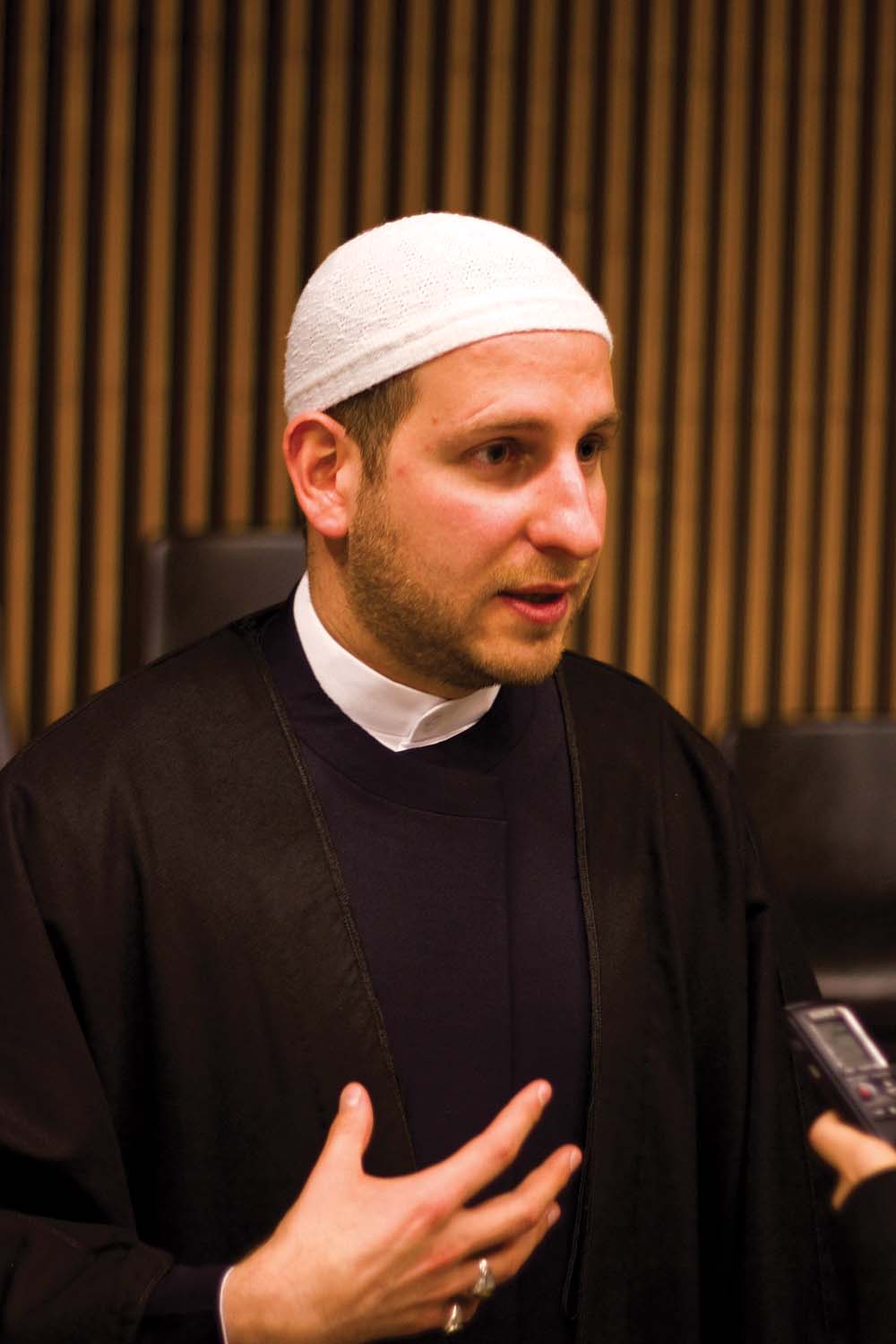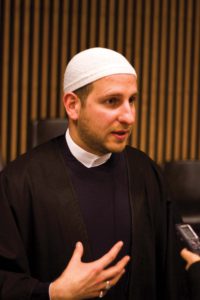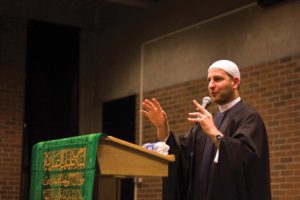Victoria Alarcon
Features & Opinions Editor
“There is a group known in Saudi Arabia as the religious police,” begins Usama Al-Atar, dressed in a black thobe and white taqiyah, sitting in front of a large group of York students on the evening of January 7. “They have the approach of ‘my way or the highway’ because they want to impose their beliefs.”
Al-Atar speaks English smoothly and clearly, a trait he has developed over the past 10 years as a public speaker, imam, and dedicated teacher. He wants to make sure everyone can hear his experience as he recounts the time he was arrested by Saudi Arabia’s religious police, and was ultimately left stranded in the country.
Al-Atar and 15 other Muslims from Canada and Britain had gone to Saudi Arabia to perform their religious pilgrimage, known as the Hajj. Every able-bodied Muslim with the means to do so is obliged to undergo the Hajj at least once in their lifetime. For Al-Atar, it was his ninth trip to Saudi Arabia, but his first time experiencing anything like the trauma the day would bring.
His day began with morning prayers. Al-Atar and his group of 15 were reciting the salutations to the Prophet in the court of the Al-Masjid al-Nabawi (Mosque of the Prophet) in Medina. Al-Atar, who led the prayer, was soon approached by religious police and told to leave. He asked them for five more minutes to complete the prayer. The police would have none of it.
Al-Atar’s group walked half a kilometre until one of them thought it would be safe to continue with their prayers, but they failed to realize that one religious police officer had been watching them the whole time.
When they were asked to leave for the second time, Al-Atar knew it would be best to leave quickly and began walking towards the exit of the mosque. He wasn’t prepared for an attack from behind. “I looked behind me to see a big guy coming at me,” says Al-Atar with a bewildered expression. “He was strangling me; he was using force.”
Bruised and beaten, Al-Atar was taken away from his group and taken to a small kiosk outside the mosque. He was taken to the Medina police where they told him he was accused of assaulting a police officer and breaking his arm.
The whole unforgettable experience is still fresh in Al-Atar’s mind as he sits telling the story that had made his name known around the world. He pauses for a moment in his story as he says “I was not afraid.” He says it again in a stronger voice. “I was not afraid. I had some courage.”
He knew he had not attacked the police officer. He knew he was in the right. Al-Atar admits that the Medina police also knew that these were false accusations against him. How could he, the man who was bruised and beaten, be the offender when the huge man who handed him over was untouched?
In Saudi Arabia, however, the religious police have considerable authority, says Al-Atar. They are responsible for enforcing their interpretation of the Sharia law (Islamic law) and if anyone disagrees, they are treated as a threat and dealt with accordingly.
For 36 hours, Al-Atar sat in a cell with his feet and hands shackled. The cell was filled with others who had similar stories like his. One man who had been praying in the Mosque of the Prophet had also been asked to leave, but instead chose to ignore the officer’s orders. It was the wrong decision; as the man was attacked, he accidentally tore off the police officer’s pin in the struggle. For removing an officer’s pin, the man was put in jail for two weeks. This made Al-Atar wonder how long he would be there if they thought he had broken an officer’s arm. He sat there confined by the shackles, praying at times and other times wondering what was going on outside the cell’s walls.
Meanwhile, Al-Atar’s story was making an impact around the world, and his story was being broadcast on CBC and CTV. His plight became international news.
“People wrote thousands of letters to the Canadian government,” says Al-Atar, recalling the humbling experience. “The way the news picked it up is a miracle.” Al-Atar distinctly remembers after he had been released, his friend had come running to him, telling him that he was all over the news and Al-Atar brushed it off as just being an exaggeration. It wasn’t until his friend showed him the different news channels that he finally believed that he had become a Human Rights celebrity overnight.
The pressure from the media and friends like Mahmood Movani, president of the Islamic Shia Ithna-Asheri Association of Edmonton, where Al-Atar works, was enough to have him released by the Medina police. On October 31, he was allowed to walk free and continue with his pilgrimage. He would return home two weeks later to his family who were awaiting his return.
Two months later, in an assembly hall filled with curious York students, Al-Atar sheds some light on how the experience had changed him. “It gave me a different perspective of injustice,” he confesses. “You hear about people being oppressed, but it’s different when you experience oppression yourself. I speak with more passion than I spoke before because I’ve been through it.”
From this experience, Al-Atar is hoping that he can pressure the federal government to create a Hajj delegation to make sure Muslim Canadians are protected from false arrests. Every year, over 2.5 million pilgrims are expected to participate in the Hajj in Saudi Arabia; his hope is that none of them go through the same experience.
As Al-Atar sits before students telling his story, he has one clear message: be proactive. He looks to students and emphasizes to raise awareness of injustices happening around the world. Just last November, a man from Iraq was detained for blasphemy and was sentenced to two years in prison and 500 lashings. Al-Atar recalls, there is nothing in the Islamic scripture that says 500 lashings should be punishment, and because the victim’s group could not do enough to spread the word, he was forced to endure the abuse.
Al-Atar remembers the day he was oppressed for his religious beliefs very well and everything that happened to him since. He even goes as far to say it was a gift from God; because on that day he felt oppression for the first time and how he reflects on it throughout his life now. “Oppression is very bitter,” he says in a calm manner. “Oppression has a very bitter taste. [That’s why we must] treat everyone with justice, dignity, and respect.”
For now Al-Atar is keeping busy, pursuing his chemistry career and accepting invitations to speak to youths everywhere. “I’m a post-doctoral fellow so I’m pursuing my chemistry career at the same time I’m a public speaker. I have many invitations so I have a busy schedule for public speaking. I do
a lot of speeches and research now.”
Event was hosted by Thaqalayn Muslim Association at York University http://yorku.thaqalayn.org/




